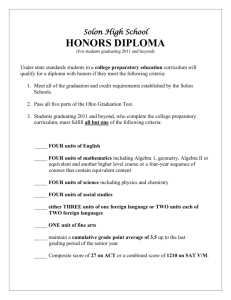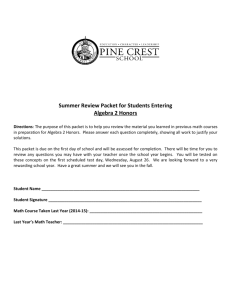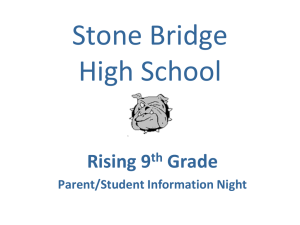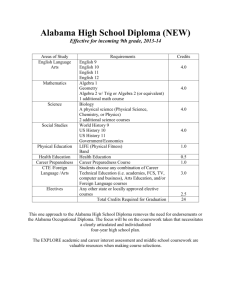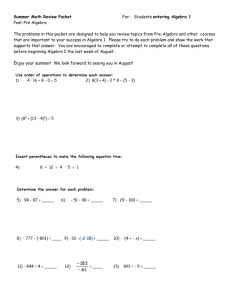Stone Bridge High School - Loudoun County Public Schools
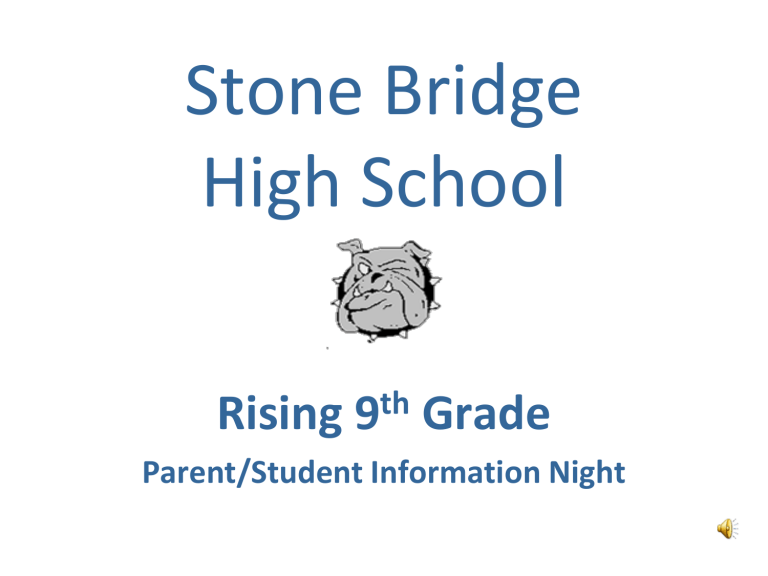
Stone Bridge
High School
Rising 9
th
Grade
Parent/Student Information Night
STONE BRIDGE HIGH
2012-2013
• Mr. Lucas Director
• Ms. Barr A-Ch
• Mr. Diamond Ci-Gh
• Ms. Halpin Gi-K
• Mr. Misik L-O
• Ms. McCarthy P-Sk
• Ms. Abrigo Sl-Z
Ethics Day Fundraiser
$20
Scheduling Process
• Informational Session
• SBHS Counselors visited
BRMS (Feb. 5 & 6) and
ERMS (Feb. 8 & 11)
• Program of Studies
• Course Selection Sheet
• Plan of Studies
• Timelines
• Visit to SBHS (April 17)
• Orientation (August)
Program of Studies
www.lcps.org/sbhs
Pages of Interest
• General Information—page 1
• Promotion and Credit Info—page 2
• Diploma Requirements—pages 4-6
• GPA and Class Rank—page 7
• Grade Weighting—page 7
• Testing Info—page 8-9
• Special Programs—pages 9-11
• Index of Courses—pages 61-66
Diploma Types
Standard Diploma Course Requirements (8 VAC 20-131-50.B)
Discipline Area
Standard Credits: effective with first-time ninth graders in 2003-
2004 through 2010-2011
Standard Credits: effective with first-time ninth graders in 2011-2012 and beyond
Verified Credits: effective for first-time ninth graders in 2003-2004 and beyond
English
Mathematics
4
3
4
3
2
1
Laboratory Science
History & Social Science
Health & Physical Education
3
3
2
3
3
2
1
1
1 Fine Arts or Career & Technical
Education
Foreign Language, Fine Arts or
Career & Technical Education
Economics and Personal Finance
Electives 6
2
1
4
Student Selected Test
Total 22 22
1
6
A student must earn a Board-approved career and technical education credential to graduate with a Standard Diploma (beginning with students entering 9 th grade for the first time in 2013-2014).
Diploma Types
Advanced Studies Diploma Course Requirements (8 VAC 20-131-50.C)
Discipline Area
Standard Credits: effective with first-time ninth graders in 2003-
2004 through 2010-2011
Standard Credits: effective with first-time ninth graders in 2011-2012 and beyond
English
Mathematics
4
4
4
4
Laboratory Science
History & Social Sciences
Foreign Languages
4
4
3
4
4
3
2
2
2
2
Verified Credits - effective with ninth graders in 2000-
2001 and beyond
Health & Physical Education 2 2
1 Fine Arts or Career & Technical
Education
Economics and Personal Finance
1
1
3 Electives 2
Student Selected Test
Total 24 26
1
9
A student must successfully complete one virtual course, which may be non-credit bearing, to graduate with either a
Standard or Advanced Studies diploma (beginning with students entering the 9 th grade for the first time in 2013-2014).
Typical 9
th
Grade
Student Schedule
• English 9
• Math
• Earth Science
• World Geog./History I
• HPE 9
• World Language
• Elective (s)
• Study Hall
High School Plan of Studies
Personal Finance
& Economics
Math
Progression
Algebra II
• Students MUST have a strong grasp of Algebra I concepts!
• Math may not be the passion for the students who enroll in this course.
Algebra II/Trigonometry
• Students MUST have a passion for mathematics and be self-motivated!
• Students MUST have a strong grasp of Algebra I concepts! Did students earn
“A”s on their midterm and final exams to demonstrate long term retention/comprehension?
• If a student is enrolled in this course, he/she should be enrolled in higher science courses as well.
This course has a common assessment for the midterm and final exam.
Functions, Algebra, and Data Analysis
• This course is a bridge between
Algebra I and
Algebra II.
• Students looking to strengthen Algebra
I skills should enroll.
• Students may need review before they enroll in Algebra II.
Advanced Functions and Modeling
• This course is a bridge between Algebra II and
Advanced
Algebra/Precalculus.
• Students looking to strengthen Algebra II skills should enroll.
• Students will be exposed to real world mathematics by completing labs.
Advanced Algebra/Precalculus
• Students should have a passion for mathematics, a
STRONG grasp of Algebra II concepts, and intentions to enroll in Calculus at some point!
• Students MUST have a strong grasp of Algebra II concepts! Did students earn “A”s on their midterm and final exams to demonstrate long term retention/comprehension?
Mathematical Analysis
• Students MUST have a passion for mathematics and be self-motivated!
• Students MUST have a strong grasp of Algebra II and Trigonometry concepts!
• If a student is enrolled in this course, he/she should be enrolled in higher science courses as well.
This course has a common assessment for the midterm and final exam.
Academic
Earth Science is a study of the interrelationships between the Earth’s composition, structure, processes, and history and its atmosphere, meteorology, oceanography, and astronomy.
Various scientists and their contributions are studied.
Students interpret various maps, charts, and tables and utilize technology, including GIS and GPS, to organize and analyze data.
Facility in using many different kinds of maps and graphics is a major outcome of learning earth science. Students also consider costs and benefits of using the
Earth’s resources in problem solving situations.
Academic Earth Science is designed as a challenging course requiring advanced reading and writing skills.
Earth Science
Honors
Earth Science is a study of the interrelationships between the Earth’s composition, structure, processes, and history, and its atmosphere, meteorology, oceanography, and astronomy.
Various scientists and their contributions are studied.
Students interpret various maps, charts, and tables and utilize technology, including
GIS and GPS, to organize and analyze data.
Facility in using many different kinds of maps and graphics is a major outcome of learning earth science. Students also consider costs and benefits of using the
Earth’s resources in problem solving situations.
Honors Earth Science is designed as a rapidly paced, challenging course requiring advanced academic skills.
Students are required to complete a school science symposium at the end of the school year. Students will be required to complete this project and report their findings at the School Science Symposium.
Honors Biology
• Students taking Biology gain detailed knowledge of living systems.Areas of study include cellular organization and processes, molecular biology, classification of organisms, genetics, evolution, and ecosystems.
• Students are expected to be able to demonstrate proper use of laboratory tools.Controlled experiments are performed and results are reported.The importance of science research is emphasized.
• Honors Biology is designed as a rapidly paced, challenging course requiring advanced academic skills. All Honors Biology students are expected to complete an in-depth, independent Science
Research Project (SRP) as a required part of their course work.
• Honors Biology students may participate in the process leading to possible selection for participation in the Loudoun
County Regional Science & Engineering Fair (RSEF).
Honors English
Students Should:
• be able to comprehend grade-level texts
• engage in reading outside of class
• command a wide range of writing strategies
• possess a spirit of inquiry, be curious
• make connections between text and real life
• apply analysis skills to new texts
Honors English
Students Should:
• be capable of fresh interpretations of old texts
• be able to develop and articulate questions
• be able to adapt an assumption when confronted with new information
• demonstrate originality of thinking
• show diligence
• be independent searchers of information
Honors English
Students Should:
• have the ability to build on what happens in class outside of class
• be thinking at a higher analytical level
• have curiosity in the English discipline
• engage in the ongoing reading of novels, blogs, nonfiction
• demonstrate a willingness to write
• engage in deep revision
• March 20th
• April 17th
• August
• September 3rd
Important Dates
Diversity in Education Fair
(6:30-8:30 @ DHS)
Rising 9 th Graders visit SBHS
(Expo Day: 9:15-10:30)
Orientation & Cook-out (last week in August)
1 st day of school
www.lcps.org/sbhs
